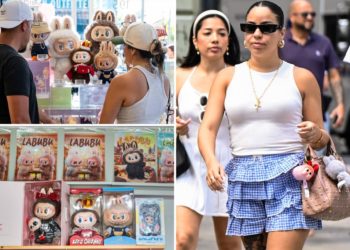When Ruby, a 29-year-old marketing professional and travel content creator from Brisbane, Australia, prepared to board her international flight to the United States, she never expected a four-letter code would turn her routine travel day into a viral moment.
In a TikTok video posted on May 29, Ruby—known on the platform as @itsrubytravels—captured the exact moment she realized her boarding pass had been stamped with “SSSS,” an acronym for Secondary Security Screening Selection.
The short clip shows Ruby, who did not share her last name, standing at Brisbane International Airport, visibly shocked, her hands clasped over her mouth. The overlaid text reads “every traveler’s worst nightmare,” while the caption warns, “not the 4 letters no traveler wants to see on their boarding pass.” Since it was uploaded, the video has amassed more than 13.6 million views.
The incident occurred on May 28, just before Ruby boarded her United Airlines flight from Brisbane to San Francisco. She told Newsweek that she had previously encountered the SSSS designation only once before, on a flight to Europe “many years ago,” and described that prior event as “an isolated occurrence.”
“This was the first time I had encountered this on a flight to/from the U.S.,” Ruby said.
The code “SSSS” indicates a traveler has been flagged for additional security screening—a process governed by the Transportation Security Administration (TSA) in the U.S. It can include extra questioning, detailed searches of carry-on items, and personal pat-downs. Ruby’s experience followed that playbook almost exactly.
“I was pulled to the side while boarding the plane and asked to step over to a table located outside the boarding gate,” Ruby said. “They told me they were doing some additional security screenings.
“This was when they asked for my passport, and had me take out my laptop, phone, and take off my shoes. They swabbed these items and my body, including my hands and stomach.”
Global demand for air travel continues to surge. A June report from the International Air Transport Association (IATA) said that international travel demand rose 5 percent in May compared to the same period last year. Load factors, or the percentage of available seats filled with paying passengers, reached record highs.
“Air travel demand growth was uneven in May,” Willie Walsh, the IATA’s director general, said in a statement. “Globally, the industry reported 5 percent growth, with Asia-Pacific taking the lead at 9.4 percent. The outlier was North America, which reported a 0.5 percent decline, led by a 1.7 percent fall in the U.S. domestic market.”
What Is the ‘SSSS’ Code?
Experts told Newsweek that the SSSS code is part of a layered safety protocol.
Rich Davis is the senior security adviser at International SOS, a risk-mitigation company. Davis has a 40-year background in aviation security, including 22 years as the chief security officer at United Airlines.
“Secondary Security Screening Selection has been in place soon after the TSA was founded in 2001,” said Davis. “It’s a security process in which travelers are selected for additional screening protocols at the airport. The selection process includes random selection, as well as potential watch-list matches and other criteria.”
The screening process can include being asked additional questions, having your luggage inspected more closely, and/or receiving a pat-down from a TSA agent. The entire process could take anything from a few minutes or much longer.
In Ruby’s case, the screening took only a few minutes and did not cause any adverse delays to her trip to the U.S. “The entire process took less than 10 minutes, and I was back to boarding the plane as usual in no time,” she said.
Despite the swift processing time, Ruby’s reaction captured in the video highlights the stress and uncertainty that can come with being unexpectedly flagged for extra security.
“There was no explanation as to why I was selected for this secondary screening process,” Ruby said.
Ben Michael, an attorney from Michael & Associates Criminal Defense Attorneys, told Newsweek that this secondary screening is legal and unavoidable.
“You cannot opt out of SSSS,” Michael said. “Legally, TSA is allowed to make any person go through SSSS, and they actually don’t disclose the specific factors that make a person have to go through it. Also, sometimes it is just random.”
Davis noted that passengers can’t remove the SSSS designation once it is assigned to a flight but advised travelers to review TSA guidelines if they feel they are being misidentified frequently.
Michael advised those who find they are chosen for secondary screening frequently to contact TSA or the airline to see if they might be able to explain why. “You could even try getting something like TSA PreCheck that should help signal to TSA when you fly that you are a verified, safe traveler,” the attorney said.
Newsweek has contacted TSA for comment via email.
Do you have a travel-related video or story to share? Let us know via [email protected] and your story could be featured on Newsweek.
The post Woman About To Board Flight, Then Takes Closer Look at Ticket: ‘Nightmare’ appeared first on Newsweek.




